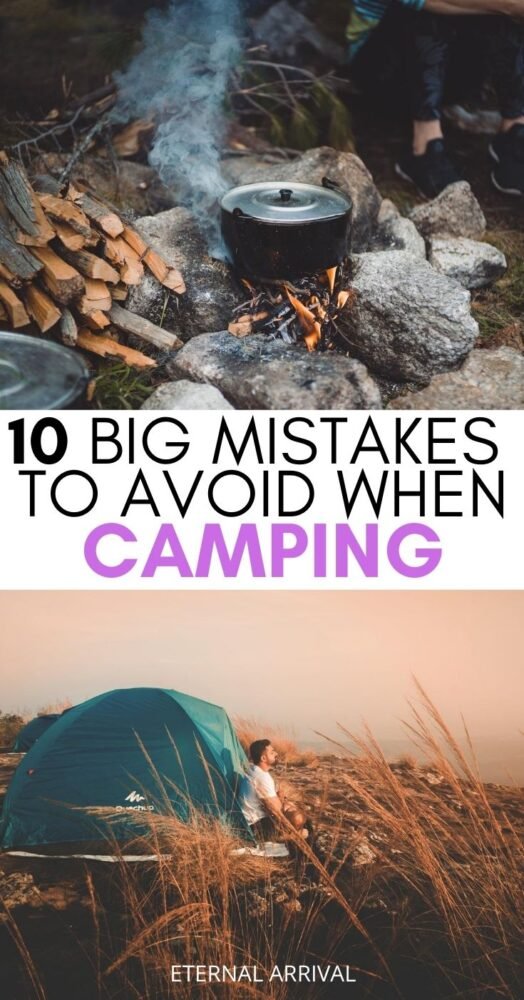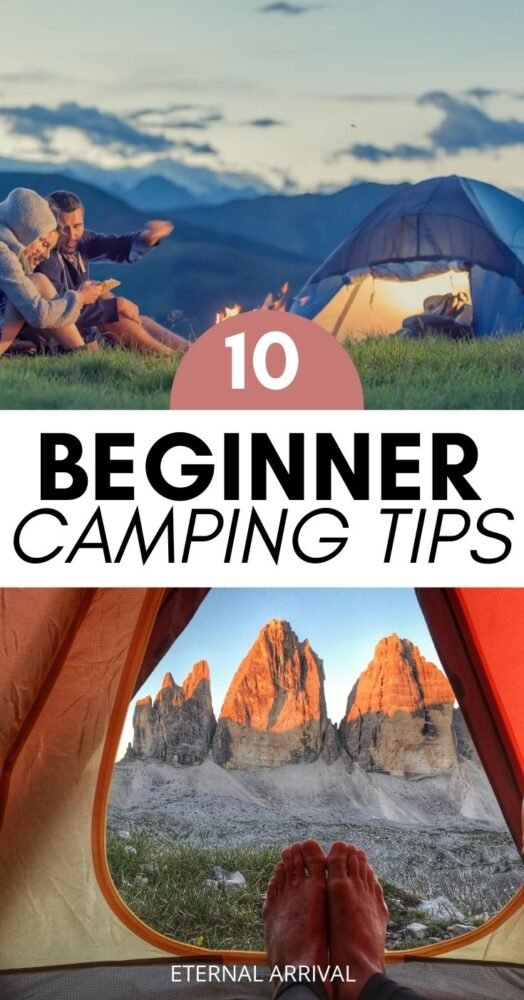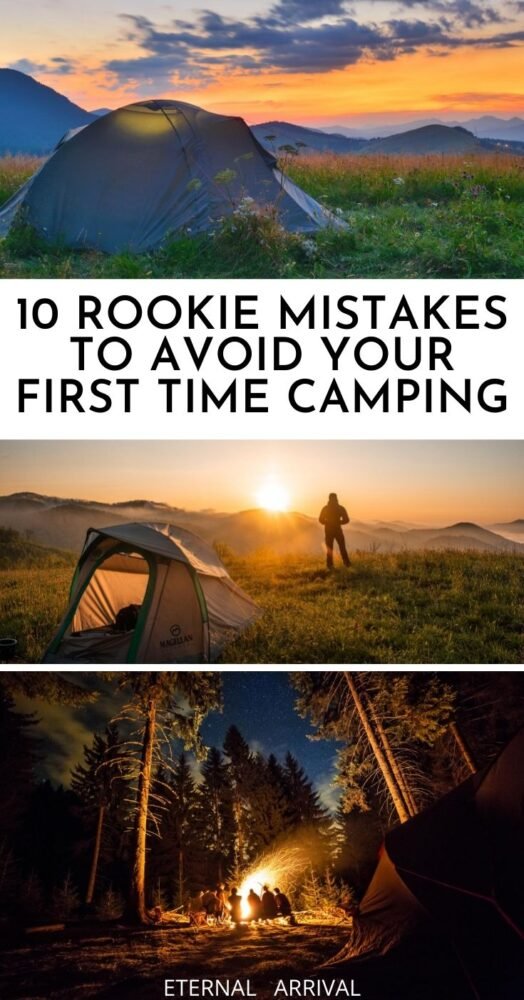The word camping evokes thoughts of simplicity, connecting to nature and relaxation.
However, if you’re not prepared or adequately equipped your dreams of a peaceful night out in nature can quickly turn into a night of discomfort and despair.
Take it from me, an avid camper who’s spent hundreds of nights under the stars!
I’ve made mistakes, learned my lessons and I know that every trip out into the great unknown brings an unexpected lesson that I can help you avoid.
10 Essential Camping Tips for Beginners: Camping Mistakes NOT to Make!
Camping Mistake #1: Not researching the area where you will be camping

Researching the area where you will be camping is pivotal for having a successful time in nature.
Looking at pictures, or having previous experience at a particular campsite is not enough. You need to invest time into picking a campsite just as you would finding a hotel. You need to understand the permits, booking instructions, sanitary facilities, and even particular closure dates of established campgrounds.
If your idea of camping lies more into the dispersed category, you need to be aware of the legalities of camping, fire restrictions, road conditions and more.
How to Avoid This Camping Mistake: The best way to research a campsite is doing an internet search, calling rangers stations, and speaking to individuals who have knowledge of camping sites.
Camping Mistake #2: Arriving at your campsite too late

Establishing your campsite after dark can be incredibly difficult and potentially dangerous.
Of course, you can set your tent up with the help of a headlamp, but knowing your surroundings is the more important purpose.
A headlamp can help you see what’s directly in front of you, but to truly be safe and ensure a peaceful night of sleep, you need to know what kind of terrain surrounds you.
For example, many campsites are marked with signs warning of flash floods, dangerous cliffs and other potential hazards. Signs like this can be difficult to spot after dark.
It’s a great idea to arrive at a campsite well before sunset so you can have the knowledge of locating restrooms, gathering water from streams, and packing food appropriately from animals.
Another plus to setting up camp at an adequate time is you get to enjoy your evening, and you won’t be the noisy campers who shine lights into fellow neighbors’ tents!
How to Avoid This Camping Mistake: The best practice for arriving at a campsite at an adequate time is doing appropriate research on how long it will take you to arrive at the destination, knowing the terrain of the trail leading into the site, and being realistic on how long it will take you to set up your gear. All this should be done at least an hour before the sun begins to set.
Still, be safe and have a headlamp and flashlight as backup!
Mistake #3: Not testing old gear or packing untested new gear

Packing for a camping trip is exciting and overwhelming all at the same time. But the most important thing to remember is to test your old gear. I call this the “gear shakedown.”
Shaking down the gear means making sure headlamps have batteries, your propane tanks have propane, doing a quick inspection of your current tent set up to make sure there are no new rips or tears, and that all required items are present for a successful trip.
Another camping mistake is packing new gear before understanding how to use it. It’s crucial to set up your new gear at home before heading into the wilderness.
How to Avoid This Camping Mistake: A good example would be setting up your new tent prior to your trip. Set it up outside or even in your living room!
You need to have an understanding of how to use your gear and if your product came with all the appropriate parts.
You don’t want to wander into nature and discover you have a lack of knowledge that leaves you vulnerable to the elements.
Mistake #4: Not storing food properly

Storing food properly is often overlooked. However, it’s vitally important for health and safety.
From a health standpoint, it’s important to keep the temperature of foods within its safe limits. This means keeping frozen foods frozen, storing leftovers properly, and cooking food to the prescribed temperature.
In terms of safety, it’s important to store food away from the wildlife, especially bears.
How to Avoid This Camping Mistake: You need to understand what animals are roaming around the terrain of your campsite. Will you be in bear country? You’ll need to hang a bear bag.
Will you be near the beach where birds can ransack your site? You’ll need to keep trash and food in plastic containers.
Understand your surroundings and prepare your food properly. I use a YETI cooler with bear-resistant locks to keep food cool and safe and away from scavengers.
If you don’t need a bear-resistant cooler or fridge, one of these camping fridges would be perfect.
Having all the right stuff will help you camp out or RV tailgate like a pro.
Mistake #5: Not bringing enough water

As a camper, you should never assume that your campsite is going to have water.
Many campsites have potable water or natural sources, but never assume that these sources are in working order.
I’ve gotten to the campsite before, banking on a spigot at the site, only to discover that the site was under water restrictions.
How to Avoid This Camping Mistake: It’s always a safe idea to pack at least 1-3 gallons per person per day. You’ll be using water for drinking, cleaning dishes, cooking food, and possibly washing up at night.
Pack more than you think you’ll need! It’s essential to keep yourself hydrated as you’ll be spending all day outside.
While it’s no substitute for packing adequate water, I suggest also bringing a Life Straw in case of emergencies, which will allow you to drink from unknown water sources safely, filtering out bacteria and viruses which could make you seriously ill.
Mistake #6: Failing to tell others where you are going

It’s absolutely essential to let others know where, when, and how long you will be camping.
Camping is typically a safe activity but you have to understand that you’re still wandering out into nature.
You’ll be dealing with the weather, animals, and possible trail hikes. Cell service is typically spotty to non-existent.
How to Avoid This Camping Mistake: There are a lot of dangers in nature and it’s a good idea to let friends and family know exactly where you intend to be and for how long in case anything is to happen they know where to look.
Another safety tip? Throw a cheap safety whistle in your bag. You’ll likely never have to use it, but better safe than sorry!
In case you get hurt or lust and need to call attention from far away, or want to warn off an animal, a safety whistle can come in handy.
Mistake #7: Relying on a campfire for food and warmth

A campfire is the essence of camping! There is nothing greater than sitting by a warm fire, roasting hot dogs (or getting more fancy with some other camping recipes!), and watching the crackling embers burn well into the night.
But you should never rely on a fire as your sole source of warmth or source for cooking. Many times you’ll run into fire restrictions, wet wood, or lack of materials to build a fire.
How to Avoid This Camping Mistake: It’s smart to always have a portable grill for food and always pack enough layers to stay warm in case you find yourself without a fire.
I love my Coleman grill/stove combo, but you can also get a cheaper propane gas stove.
For layering, a thermal base layer with warmer outer layers and a well-rated sleeping bag is key.
Mistake #8: Forgetting insect repellent or sunscreen

Sunscreen and insect repellent are life savers when camping outside. I remember leaving for a Colorado camping trip in July.
Having never been to Colorado in July, I failed to pack the bug spray. (I thought bugs only existed in Texas).
I arrived at the campsite, high up in the San Juan Mountain Range, and was immediately attacked by every bug known to man.
I spent the rest of the evening bundled up in long sleeves and long pants in an attempt to keep the bugs off my skin. I was sweating, swatting, and terribly annoyed.
My fun time was quickly reduced to trying to just get through the night!
Don’t forget about preventing ticks as well as mosquitos! Both are pests which can easily ruin your camping trip.
How to Avoid this Camping Mistake: I now always have insect repellent and sunscreen in my camping bag no matter what time of year, no matter where the destination takes me.
Here’s a good bug repellent and the mineral, water-safe sunscreen I use.
Mistake #9: Not packing adequate clothing

Packing the appropriate clothing is absolutely essential to survival and comfort in the wild. This means you need to research the weather before setting out into the great unknown.
You need to know what the low and high temperature is going to be, whether there is rain or snow in the forecast and also being prepared for extreme wind. It’s easy to be ill-prepared for the elements.
Underestimating how cold it can get in the middle night is a typical mistake I make, even as an experienced camper!
How to Avoid This Camping Mistake: Pack plenty of warm clothes for layering, an appropriately rated sleeping bag, and don’t forget to cover your head with a hat as most heat escapes through the top of your skull.
A 30-degree sleeping bag is usually good, but if temperatures may dip below freezing, go for a 15-degree rated sleeping
Mistake #10: Refusing to follow the “Leave No Trace” guidelines

Camping etiquette is essential if you’re going to be sharing the land with fellow campers. This includes following the “Leave No Trace” rule.
Leave No Trace means you are responsible for disposing of any trash you may produce.
Nothing ruins your escape into the wild more than stumbling upon someone else’s trash that they left behind.
Not only is left over trash ugly and gross, it’s dangerous to the environment and wildlife.
How to Avoid this Camping Mistake: Most campgrounds have large bins to help reduce litter, but if you’re dispersed camping, please pack up your trash and dispose of it at your earliest convenience.
***
Camping trips are the quintessential way to experience the great outdoors. Like me, I’m sure you’ll run into your own camping and packing mistakes.
The best way to survive your camping mistakes is to embrace them, make the best of your situation, and write down your mistakes so you’ll be prepared for next time!
Pin These Beginner Tips for Camping & Common Camping Mistakes!
Sabra is an adventure-hungry outdoor enthusiast originally from Dallas, Texas. She has been to 33 states, 3 countries, and has traveled America while living out of the back of her truck. Besides writing, Sabra can be found powerlifting, running her online personal training business, and enjoying time with friends and family.



